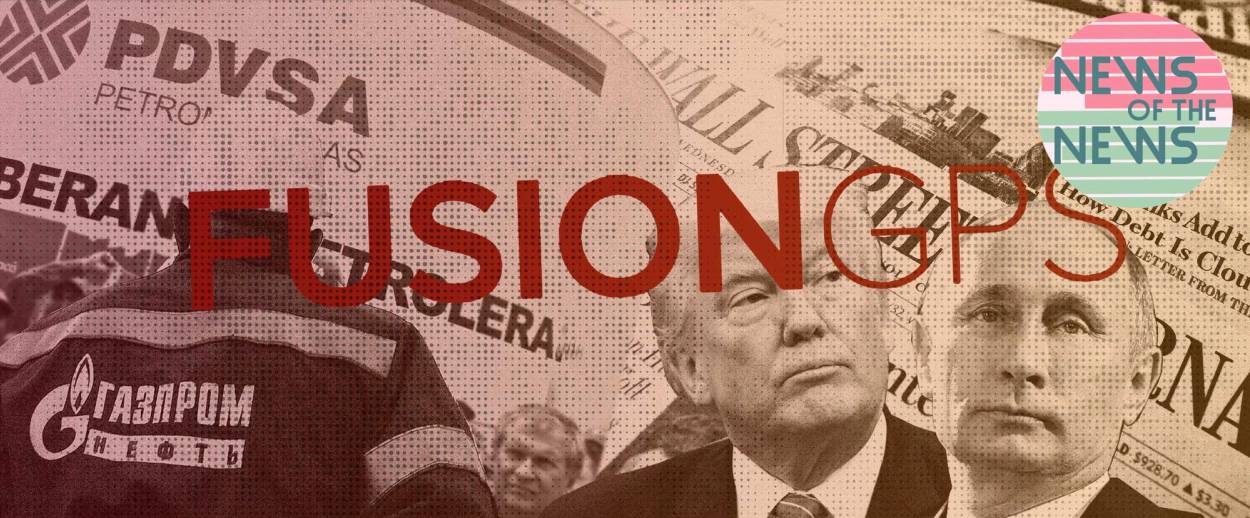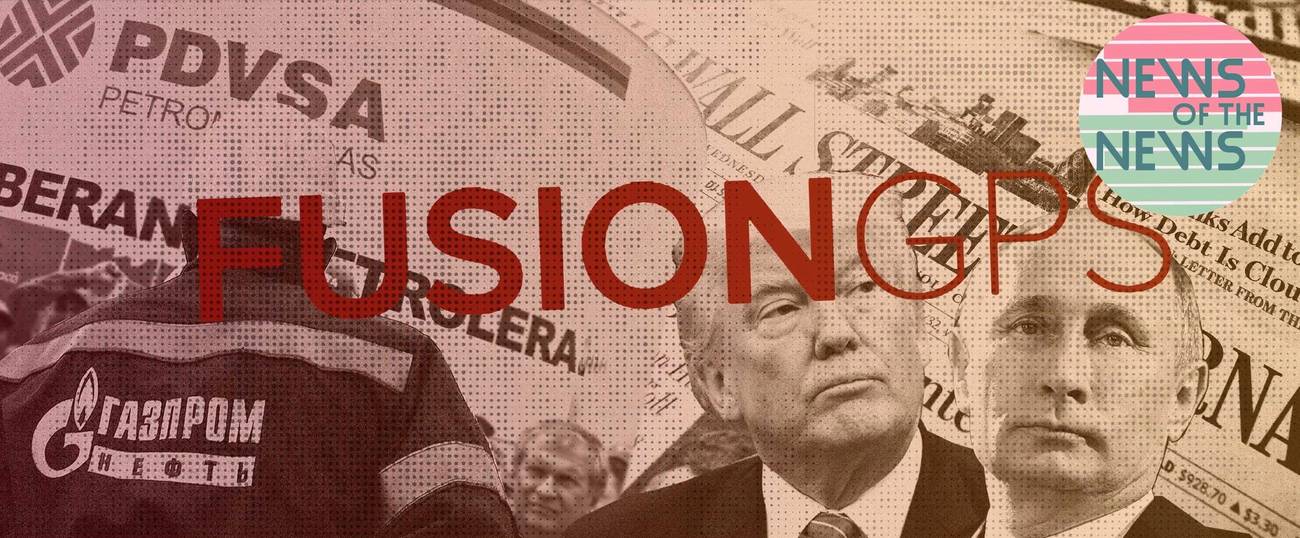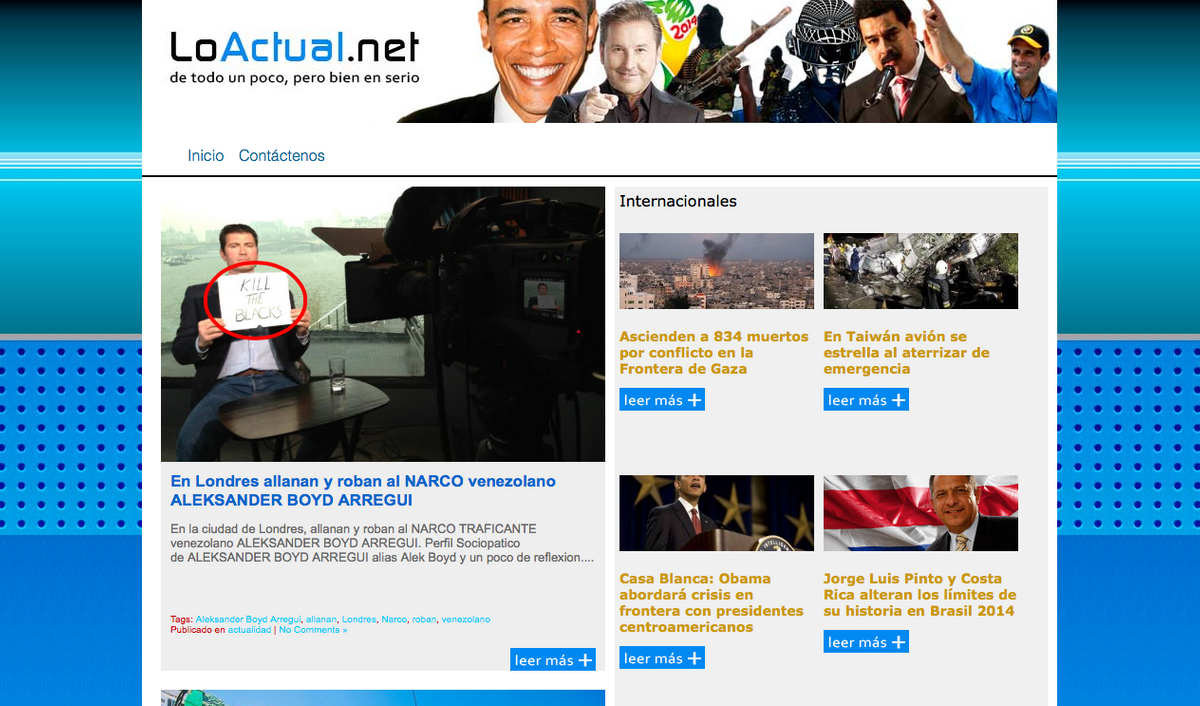News-For-Hire Scandal Deepens: ‘Fusion GPS’ Sleazy Venezuela Links Shed New Light on Trump Dossier
News of the News: an oppo-research-for-hire outfit of former reporters tries to seed stories in the American press for global clients




The Fusion GPS news-for-hire scandal has not only led to the public identification of the source of the “Trump Dossier”—a for-profit company that provides opposition research to whoever could write big checks, which is staffed by four former Wall Street Journal reporters led by Glenn Simpson. The scandal has also lifted the lid off a sewer of corporate information warfare and opposition research that the flailing institutions of the mainstream press now regularly re-package as news, without ever saying where it came from—or who paid for it. While the idea that the products of paid opposition research are being main-lined by name news outlets makes an ongoing mockery of claims to objective reporting, that part of the story is hardly new—it goes back at least to the partisan warfare of the 1990s. So why is Fusion GPS such a big deal?
The Trump Dossier, and the firestorm it ignited, is only one piece of the Fusion GPS story. What’s new about Fusion GPS and its fellow DC oppo shops—few of which register as foreign lobbyists—is that they take money from entities linked to foreign governments that are eager to re-frame or invent news stories to punish their enemies at home and torque American foreign policy by controlling information. When you connect the dots between Fusion GPS’s foreign clients and U.S. media outlets, a much more disturbing picture emerges of the firm’s activities, and what they reveal about the weakened state of the American press, and American democracy.
Faith in the outfit’s journalistic expertise and experience is one of the chords that Fusion GPS strikes in its relations with journalists, whether they’re trying to block a story or shop one. “If they have a story they think you’d be interested in,” says one Washington, D.C. journalist familiar with Fusion GPS’s operations, “they call you down to their office on Dupont Circle and show you a dossier. There’s no confidentiality agreement, but it’s understood that if they show you something and you talk about it, you’re cut off, or worse.”
The fact that Fusion GPS has the whip-hand in its relationship with journalists hardly compels the company to be honest—revealing sources is for suckers, especially when your “sources” are paying the bills. At the same time as Fusion GPS was being paid directly by Russian clients in Washington, it was also being paid by a Venezuelan company called Derwick Associates that reportedly skimmed billions of dollars from rigged contracts with Hugo Chavez’s regime—and which did large amounts of business with Russian state companies like Gazprom and Gazprombank that are sanctioned by Washington for issues related to Russia’s involvement in Ukraine. That’s how Fusion GPS kept the lights on.
If taking money from repressive kleptocracies is an ugly business, an even uglier story emerges when you start connecting the dots. Add Fusion GPS’s contracts with Russian and Russian-linked entities together with the company’s role in compiling and distributing a defamatory dossier sourced to the Kremlin, and the idea that the Trump Dossier was a Kremlin information operation becomes quite plausible—with much of the U.S. media serving as the delivery mechanism for a poison dart aimed at the legitimacy of the American democratic system.
But wait: How could the Kremlin be targeting Donald Trump, at the same time as it was trying to elect Trump by hacking John Podesta’s emails and spreading them on Wikileaks, and running anti-Hillary Clinton conspiracy stories on Russia Today? The answer is that the purpose of Russia’s interventions in the 2016 election wasn’t to elect either Clinton or Trump, for a traditional quid pro quo. Information operations don’t work that way; they’re hammers, not scalpels. You can sow distrust and confusion, and pit groups against each other—but you can’t move swing voters in Wisconsin from one column to another with any kind of reliability, and efforts to achieve such a straightforward aim are more likely than not to backfire.
No, the point of the Kremlin’s assault on the American election of 2016 was to defame both candidates, and sow chaos, and thereby to discredit the American system of government, which rests on the consent of the governed. By any measure you care to use, the Kremlin has succeeded, and Fusion GPS was one of its most useful instruments.
***
In order to understand Fusion GPS’s role in Venezuela, and how that work connects to the Trump Dossier and the firm’s other activities in Washington, I recently interviewed the Venezuelan investigative reporter Alek Boyd, who has compiled a dossier of his own about the firm’s activities in his native country. In 2006, Boyd met Thomas Catan, who would later join former Wall Street Journal colleagues Glenn Simpson and Peter Fritsch at Fusion GPS, when Catan was covering the Venezuelan presidential elections for the Times of London.
“Catan’s father was from Mexico, so we spoke to each other in Spanish,” Boyd told me earlier this week in a phone call. “He came to my house for dinner with my family. Fast forward a few years: I’m looking into this group of young Venezuelan businessmen who won $1 billion worth of contracts for power plants in Venezuela, without bidding.” That was Derwick Associates, five young Venezuelan businessmen with ties to figures in the Chavez regime.
Later, as Boyd reported, Derwick also entered into a partnership with Gazprom to enter the Venezuelan oil sector, through a strategic venture with Petroleos de Venezuela (PDVSA). “As soon as Hugo Chavez took over the state oil conglomerate,” says Boyd, “he fired some 20,000 people so he had to replace their knowledge and experience, and he looked to international partnerships, which would have a large percentage, but not a majority stake. Obviously Russia has been staunch supporter all along of Chavez.”
Gazprom, one of Russia’s own state oil conglomerates, entered the Venezuelan market. In one of their ventures, Gazprom partnered with Derwick Associates in a deal with PDVSA. “What does Derwick bring to the table?” Boyd said to me. “They had no track record related to oil. All they had was misappropriated millions and their network of contacts, which they used to provide an expensive loan to Gazprom and insert themselves into a joint PDVSA-Gazprom oil production deal.”
For all Derwick Associates’ ambition, Boyd told me, what was really exceptional about them “was that when journalists started asking questions, they threatened legal action. Most corrupt Venezuelan businessmen get their money and buy a condo in Miami and fly off into the sunset quietly. But these guys seemed to like the attention. They waged an international censorship campaign and it was the clumsiness of the campaign that got my attention.” (Derwick did not respond to requests for comment.)
So Derwick called in Fusion GPS. In 2014 Boyd received a tip that one of Catan’s colleagues at Fusion GPS had flown to Caracas to meet with Derwick principals. “Catan denied it,” Boyd told me. “But I had a copy of a hotel reservation from July 2014 with Peter Fritsch’s name on it.”
Fritsch, said one journalist who knows him, is the man who keeps the trains running on time at Fusion GPS. “Simpson has the contacts,” says the journalist, who asked not to be named, “but Fritsch is the guy who keeps order there.”
The purpose of Fritsch’s visit to Venezuela was to meet with reporters from the Wall Street Journal who were working on an investigative article about Derwick Associates. “Fritsch came with a lawyer, Adam Kaufman, who’d worked with Robert Morgenthau at the New York District Attorney’s office, to silence any further investigations from the Wall Street Journal,” says Boyd. “It was those two, a group of Derwick executives and Journal reporter José de Córdoba. They [said] would provide documents to show the contracts were legitimate, which they never did.”
Another source familiar with the circumstances of the meeting explains that “it was mostly a visual presentation. There were lots of documents but not enough time in a month to go through them.”
Boyd says that the purpose of the trip was to bully the Journal into silence. At the Journal de Córdoba had worked under Fritsch. The Journal published a report from de Córdoba after his visit, but Fritsch’s meeting apparently derailed a longer investigative piece. De Córdoba stated that the “blatant intimidation tactics” he faced made him feel “uncomfortable.”
When asked for comment, Wall Street Journal spokesman Steve Severinghaus sent this statement to Tablet: “The Wall Street Journal doesn’t withhold publication of any articles due to pressure from anyone. In fact, our Aug. 8, 2014, article was at the forefront in reporting federal and New York City preliminary investigations into the Venezuelan company Derwick Associates. The Journal‘s editorial decisions are independent and in keeping with our long tradition of tough and fair reporting.”
***
It looks like De Córdoba was right to feel uncomfortable. On Wednesday, the Senate Judiciary committee heard written testimony from human rights activist Thor Halvorssen regarding Fusion GPS that backs up the account that Boyd gave me. “In 2012 I began researching a Venezuelan corruption scandal that also involved U.S. banks, companies, and even U.S. courts,” the Venezuelan-born Halvorssen writes in his testimony. “This story should have received extensive exposure on the front pages of America’s national newspapers. Fusion GPS, however, was hired to spike these stories. Even though it was clearly acting as a public relations counsel on behalf of a foreign principal, Fusion GPS never registered under FARA and was able to engage in nefarious activities without public scrutiny.”
Echoing the testimony he gave to Congress, Halvorssen told me on the phone this week that as media fixers Fusion GPS’s method is to sow doubt in the minds of reporters who are investigating stories about their clients. “They come in and say, ‘I’m telling you the truth, you’ve known me from the Wall Street Journal for twenty years, I’m respectable. They trade on their past reputation and that’s what they’re selling to their overseas clients, the ones with criminal problems.”
According to Halvorssen, Fusion GPS also resorted to much more aggressive tactics in defending Derwick Associates. As Halvorssen writes in his testimony: “Mr. Fritsch sent Mr. De Cordoba a dossier containing false and derogatory information about me and about the other whistleblowers who have drawn attention to Derwick. … Fusion GPS was responsible for the defamation campaign.”
“They placed false accusations that I was a heroin addict, a pedophile, and guilty of embezzlement,” Halvorssen told me. “They could have done something about me that was plausible, like attacked the Human Rights Foundation, the Oslo Freedom Forum”—organizations Halvorssen runs—or some run-of-the-mill shortcoming. But their point is to make the accusations so appalling that there can be no defense. The point is to make you radioactive. And what’s interesting is that it was the same pattern of accusations against multiple people.”
Boyd claims that he was also targeted in a social media campaign that described him as a drug trafficker, extortionist, car thief, and pedophile. Here is a sample screen grab taken from websites with articles targeting Boyd:

His home in London, where he now lives, was broken into and his computer was stolen, according to London police reports, although the culprits have not been identified. Photographs of his young daughters, taken with a telephoto lens, were put in his raincoat. He also received an anonymous note threatening his daughters with sexual abuse.
“I think Fusion GPS played a key role in the campaign against me,” Boyd believes. “Derwick doesn’t understand how media works. Fusion GPS was there to lead them and explain it to them. Because of their background, they have an impressive array of contacts they can rely on to discredit someone—‘You don’t want to listen to that guy, he has a criminal past, he’s a pedophile.’ ”
When asked to comment on Boyd and Halvorssen’s charges, Fusion GPS sent a statement to Tablet. “Fusion GPS did not launch a defamation campaign against Thor Halvorssen or Alek Boyd. Halvorssen’s statement is filled with inaccuracies and falsehoods. The only verified defamation campaign is the one being pursued against Fusion GPS. The president and his allies have tried to smear anyone who has tried to investigate Trump’s Russia ties.”
However, both Boyd and Halvorssen’s investigations of Derwick Associates predated Donald Trump’s presence on the American political scene by several years. It is difficult to understand how the “dirty tricks” and defamation campaigns waged against them have anything to do with Trump. The same goes for Bill Browder—one of the main forces behind the Magnitzky Act, passed in 2012, which sanctions Russian figures involved in the detention and 2009 death of Browder’s late lawyer Sergei Magnitzky. Browder says he was similarly targeted by Fusion GPS.
In his testimony yesterday before the Senate Judiciary Committe, Browder argued that Fusion GPS had waged a smear campaign against him and Magnitsky. Glenn Simpson, said Browder, “contacted a number of major newspapers and other publications to spread false information that Sergei Magnitsky was not murdered, was not a whistle-blower, and was instead a criminal. They also spread false information that my presentations to lawmakers around the world were untrue.”
As Halvorssen testified before Congress, Fusion sometimes outsources its smear campaigns. Halvorssen told me that “Kenneth Silverstein was attacking me on behalf of Fusion GPS in fringe websites as well as across social media.” (Here’s an article Silverstein published in 2015 about Halvorssen.) According to Halvorssen, Silverstein made the same accusations that Derwick Associates had, based on the same dossier and false accusations Fusion GPS was behind. “They used Silverstein to launder and place the information. He was at one point in the past a respected journalist with a serious career, so it gave the impression of being somewhat legitimate coming from him.”
When I contacted Silverstein for comment, he contested Halvorssen’s account. “It’s a complete fabrication,” Silverstein said. “No one at Fusion GPS ever gave me a file about Thor Halvorssen or any information about him. No one at Fusion ever asked me to write about him or anything having to do with Venezuela.”
Silverstein, believes Halvorssen, likely played a role similar to Christopher Steele’s as author of the Russia dossier on Trump. “Chances are that Steele had only partial responsibility. They could be just using his reputation as a former British intelligence officer to legitimize a smear campaign. There’s nothing Fusion GPS isn’t willing to do for money. They work for agents of the Kremlin, after all.”
It’s one of the peculiar paradoxes of the media today that the firm that sparked the anti-Trump resistance, and fueled the patriotism of those newly awakened to the dangers of Russian interference in American political institutions is working with companies intimately linked with Moscow. Fusion GPS is working to undo the U.S. sanctions on Russia implemented by the Magnitzky Act, and has been networked into Gazprom’s investment in Venezuela’s energy sector alongside Derwick Associates. And yet the U.S. media is focused on the Great Kremlin Conspiracy, the fruit of what appears to be only one in a series of smear campaigns waged by Fusion GPS. Sure, the reasons are partly ideological—Trump is not the press’ preferred candidate. And financial—the daily campaign against Trump is driving traffic that print and broadcast haven’t seen in a long time.
The press has its hands tied. “If they report that the Russia dossier is probably nonsense,” said Halvorssen, “and Fusion GPS is running information operations across the media, then that calls into question all the other stories that Fusion GPS has fed journalists in the past. Why are so few journalists willing to look into Fusion GPS?”
In order to report honestly on the Trump scandals, a weakened press would have to report honestly on Fusion GPS—which would mean lifting the lid on the incompetence and malfeasance of their own institutions and colleagues, which would reveal a scandal as threatening to democracy as anything Trump has said or done. “Imagine if they subpoena Fusion GPS’s emails,” said a veteran Washington reporter, “there are going to be lots of journalists in there who’ve taken stories from them. Big names, senior figures in the field. It will look like an apocalypse.”
***
You can help support Tablet’s unique brand of Jewish journalism. Click here to donate today.
Lee Smith is the author of The Permanent Coup: How Enemies Foreign and Domestic Targeted the American President (2020).